Putin Will ‘Certainly’ Visit Iran At Some Point - Kremlin
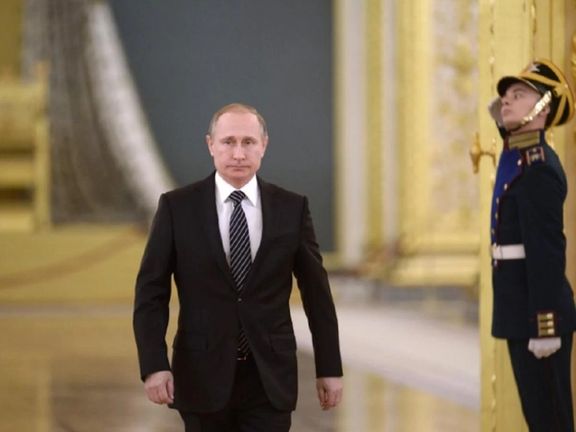
Kremlin spokesman Dmitry Peskov says Russian President Vladimir Putin will certainly visit Iran at some point, but the exact date of this visit is yet unknown.

Kremlin spokesman Dmitry Peskov says Russian President Vladimir Putin will certainly visit Iran at some point, but the exact date of this visit is yet unknown.
According to TASS, Peskov made the remarks on Friday, a day after Iranian Foreign Minister Hossein Amir-Abdollahian expressed hope that the Iran-Russia-Turkey summit will eventually convene in Tehran.
"He will certainly [go there] over time, but exact dates are yet to be determined," the spokesman said, when asked to comment on the possibility of Putin visiting Iran and participating in a summit in the framework of Astana talks over the conflict in Syria.
Plans to hold such a meeting in Tehran were announced several times before the covid-19 pandemic hit the world, but the event had to be postponed many times since.
After the 16th meeting of the Astana process in Kazakhstan's capital Nur Sultan in July 2021, Turkey, Russia and Iran pledged to maintain cooperation in Syria to bring the warring sides together to find a permanent solution to the decade-long war.
Initiated by Turkey, Iran and Russia, the Astana meeting is focused on the constitutional system, political transition, security and resettlement. The first Astana meeting was held in Turkey in January 2017 to facilitate United Nations-sponsored peace talks in Geneva.
Russian Foreign Minister Sergei Lavrov was in Tehran on Wednesday and Thursday for an official visit, aimed at boosting trade and energy cooperation as the two countries grapple with Western economic sanctions.
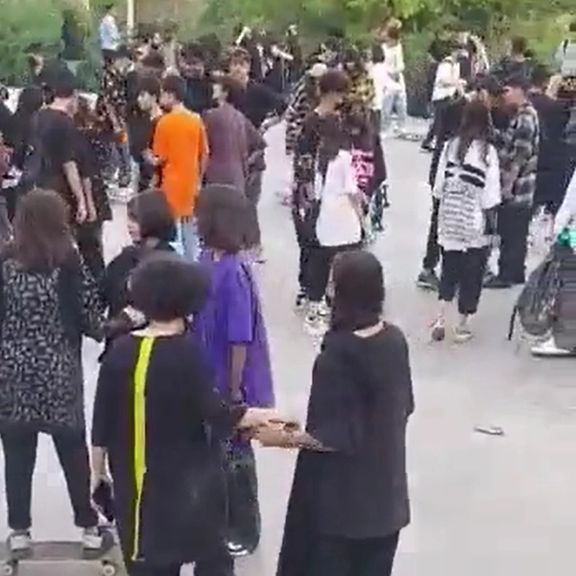
The governor of the southwestern city of Shiraz says several people have been arrested following the release of a video showing a gathering of teenagers who were not observing compulsory hijab.
The video that went viral on Thursday showed dozens of teenage boys and girls gathered in one of Shiraz's main streets. Many of the teenage girls were not wearing headscarves as is mandatory for girls over the age of nine.
The city’s governor Lotfollah Sheibani called it a "norm-breaking rally," adding that as soon as they were informed about the gathering, the police, in coordination with the judiciary, took action to identify and detain the organizers. "So far, 10 people who organized the rally have been arrested."
However, a few hours later, Fars News Agency, affiliated with the Revolutionary Guard, quoted the Chief Justice of Fars province as saying that only "five of the main organizers of the ceremony were arrested, and none of the participating teenagers are detained."
Recently, Iran’s morality police arrested 120 people in a nature tour in the forests of the Caspian Sea area for flouting their hijab, dancing together, and drinking alcohol.
Since hijab became compulsory in Iran, within a couple of years from the establishment Islamic Republic in 1979, many women have been resisting the prescribed standards of hijab promoted by the state and refuse to accept it even at the cost of being arrested, fined or even lashed.
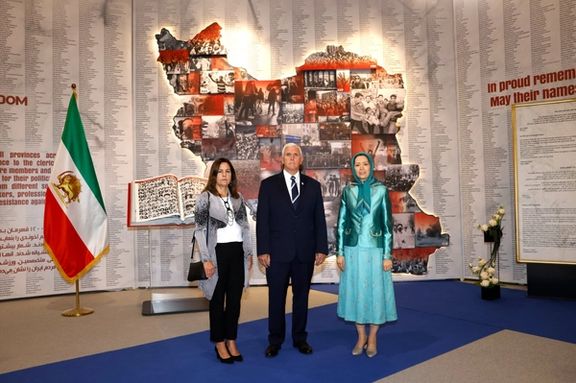
Former US Vice President Mike Pence has visited the camp in Albania of the Iranian Mujahedin-e Khalq (MEK), denouncing the Iranian regime for its “brutality.”
Pence, who traveled to Albania to visit the Ashraf-3 camp 30 kilometers (19 miles) west of Albania’s capital, Tirana, home to some 3,000 Iranian exiled dissidents from the MEK on Thursday, urged the Biden administration “to immediately withdraw from all nuclear negotiations with Tehran, voice support for the organized opposition in Iran, and make it clear that America and our allies will never permit the regime in Tehran to obtain a nuclear weapon.”
Pence described Iranian President Ebrahim Raisi as “a brutal mass murderer responsible for the 1988 massacre of 30,000 political prisoners,” noting that his election was “intended to quash internal dissent and intimidate the people of Iran into remaining silent.”
The estimated number of prisoners killed in 1988 is around 5,000, however MEK insists 30,000 were massacred.
Pence warned that “a renewed deal with Iran won’t block Iran’s path to a nuclear bomb,” adding that a deal would not “benefit the people of Iran in any way but “merely empower and enrich a corrupt regime that has tormented and tortured the Iranian people for generations.”
In May, former Secretary of State under President Donald Trump Mike Pompeo also paid a visit to the camp in Albania.
Some Iranian dissidents criticize US officials' visit to the MEK center in Albania, as they regard the organization as non-democratic.
The Islamic Republic holds the MEK responsible for bombings in Iran in 1980s and for its alliance with Saddam Hussein until his overthrow in 2003. The United States relocated the opposition group from Iraq to Albania in 2013 as pro-Tehran Shiite groups were attacking the MEK and Kurds were demanding to hold the organization accountable for siding with Saddam.

The chief of IRGC’s intelligence was replaced due to long-simmering opposition by other top security figures, information received by Iran International shows.
After two days of rumors, it was announced on Thursday that Hossein Ta’eb, the long serving head of the Revolutionary Guard’s Intelligence organization (SAS in Persian acronym) was replaced by Mohammad Kazemi, another figure in the outfit.
The change considered to be a pivotal move by Supreme Leader Ali Khamenei came after a series of unexplained deadly attacks against IRGC officers and other breaches of security in Iran’s nuclear and military installations.
Information received by Iran International indicates that the chief commander of IRGC’s Quds (Qods) Force Esmail Ghaani (Qaani) and Esmail Khatib, the minister of intelligence, were two of the most high-ranking critics of Ta’eb, who were waiting a long time for an opportunity to push for his removal.
According to the information at our disposal, Ta’eb’s opponents had repeatedly argued that SAS had failed to carry out its mission under his leadership.
Our sources said that in recent months heads of other intelligence and security entities had sent repeated messages directly to Khamenei’s office in essence demanding the dismissal of those who had gone too far in using their powers “for neutralizing terrorism and espionage” inside the country.
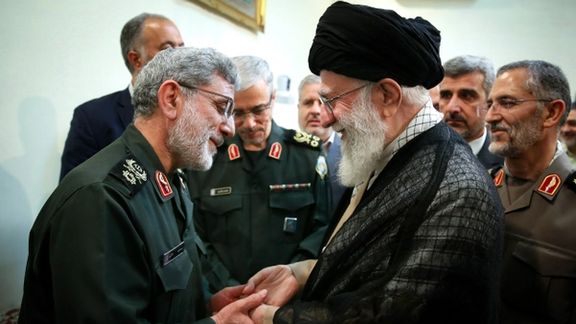
Sources added that Ta’eb’s high-ranking opponents had argued that his organization did not use “the elementary standards for neutralizing terrorist activities” in Iran. They also charged that the recruitment of “amateurish and non-professional” elements in extraterritorial operations harmed Iran’s other security entities.
In recent weeks, there were several revelations of Iran’s plans to attack and harm Israelis and others abroad. Particularly, Israeli officials said in June that plots to harm Israelis in Turkey were foiled and urged their citizens not to travel to Istanbul. Ankara reported this week that its security arrested several Iranian operatives.
In short, Ta’eb’s opponents in other intelligence and security entities had been demanding a cleansing of IRGC’s Intelligence Organization, the dismissal of key people and redefining its duties by eliminating some of its responsibilities.
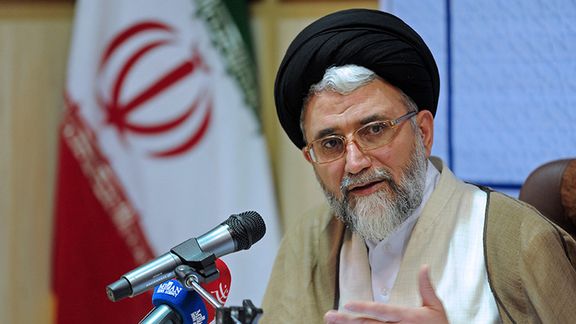
The Islamic Republic has two main intelligence organizations: the Ministry of Intelligence and the IRGC Intelligence Organization. The ministry nominally is under the president’s control and regards itself as the most professional entity. But in fact, it is also controlled by Khamenei, who selects the minister.
While the ministry of intelligence regards itself as the “professional” outfit for all espionage and counter-espionage activities and the Quds Force sees itself in charge of all extra-territorial operations, IRGC’s intelligence in recent years had entered their turfs, creating tensions.
Information received by Iran International indicates that Ta’eb’s failures in espionage, counterespionage and unsuccessful operations abroad presented an opportunity to its rivals to weaken it.
His replacement, Mohammad Kazemi is seen by others as a “gray bureaucrat” and is not considered an “operations” person. His appointment, therefore, is an attempt to settle scores by dismissing many key and senior people in SAS.
Repeated failures in foreign operations
Operations by IRGC’s intelligence outfit is divided into two units: Special Operations or unit 4000, and Counterespionage Operations or unit 1500.
Our sources said that during Ta’eb’s leadership, the role of Unit 1500 changed to “terrorist” operations abroad, which suffered repeated failures in its missions, leading to calls for his dismissal.
The May 22 assassination of Hassan Sayyad in Tehran, who was in charge of some of the operations as head of Unite 840 was “the most serious failure” for Ta’eb from the perspective of his opponents. Some were pointing out that Sayyad was not even warned by counterespionage about threats he was facing.
Another defeat, according to sources, was the arrest of three senior officers of SAS in the United Arab Emirates in November 2021, that required months of diplomatic negotiations to free them.
The arrest of dozens of people in Cyprus for having ties with the IRGC and being involved in a plot to kill Teddy Sagi an Israeli businessman last year, and more arrests in Turkey in February for a plan to kill another Israeli businessman, Yair Geller, were other examples of Ta’eb’s failures.
A more recent example was the revelation of a plot to kidnap the former Israeli ambassador in Turkey, which further humiliated Iranian intelligence and gave more credit to Israeli counterintelligence. The incident resulted in the cancellation of foreign minister Hossein Amir-Abdollahian’s visit to Turkey.
These led to more accusations against Ta’eb that not only he fails in his missions, but he created serious problems for other entities, including for Iran’s diplomacy.
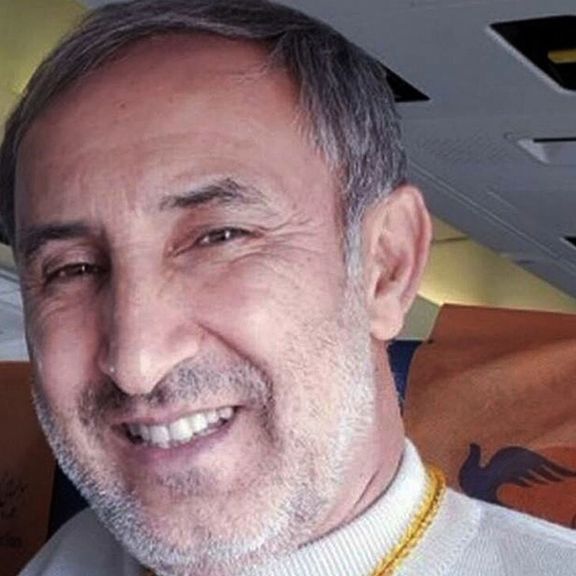
The Swedish Ministry of Foreign Affairs has advised its citizens against traveling to the Islamic Republic of Iran due to the security risks to foreigners.
Ahead of the conclusion of a trial that has soured relations between Iran and Sweden, the ministry said in a statement on Thursday, "Due to the security situation, the Ministry of Foreign Affairs advises against all travel to Iran."
“In recent times…Iran has in various ways expressed its dissatisfaction with an ongoing trial against an Iranian citizen in Sweden,” the foreign ministry said. It had previously advised against all unnecessary travels.
Swedish prosecutors requested a life sentence for former Iranian prison guard, Hamid Noury (Nouri), on trial in Sweden for his role in the execution of up to 5,000 political prisoners in 1988, while Swedish-Iranian scientist Ahmad-Reza Djalali faces the death sentence in Iran after he was arrested on trumped-up charges of spying.
Sweden is probably worried that Iran may detain Swedish citizens to have more bargaining chips for the release of Noury, who was arrested in November 2019 while visiting Sweden. Sweden used the principle of universal jurisdiction to arrest and prosecute Noury, because the alleged crimes amounted to war crimes. His verdict is due on July 14.
Iran has repeatedly ruled out a prisoner swap with Sweden.
Sweden on March 10 deported back to Iran two alleged Iranian agents who were arrested for links to a terrorist plot, instead of putting them on trial, since it does not want more tensions in its relations with Tehran.

Gerardo Milman, an Argentine lawmaker, told Iran International that Iranians aboard a Venezuelan plane held in Buenos Aires planned “attacks on human targets.”
Speaking Thursday in Spanish to anchor Fardad Farahzad, Milman, who has pressed for information over the incident, disputed explanations given by both the Argentinian and Iranian governments.
Contrary to Iran’s claim June 13 that the plane was not owned by an Iranian company and that any Iranians aboard were instructors, Milman said the pilot was “a senior Qods (Quds) official, especially a member of the Ministry of Intelligence,” apparently suggesting he was a member of the Qods brigade, the extraterritorial arm of Iran’s Revolutionary Guards (IRGC).
Milman said the pilot, who had “fought in the war [1980-88] against Iraq, together with the current Minister of the Interior [Ahmad] Vahidi,” was a shareholder in the Iranian airline Mahan Air, which has been sanctioned by the US Treasury. Milman said the co-pilot, who was “even more problematic,” was using a false name.
Anibal Fernandez, Argentina’s security minister, said June 11 the government had immobilized at Ezeiza airport (Buenos Aires) a “Venezuelan plane sanctioned by the United States and withheld the passport of five Iranian crew members.”
While US sanctions have no force in Argentinian law, any supplier might be wary of punitive US action over supplying fuel. According to the Spanish-language website Infobae, the plane, minus the five Iranians, was subsequently denied permission to fly to Uruguay to refuel.

The plane had arrived in Argentina, from Mexico June 6, carrying automotive parts, but according to Argentinian media, an inspection found five Iranians aboard who, unlike at least 12 Venezuelans, were not on the passenger manifest. The Iranians’ passports were impounded – presumably on the grounds they were violating immigration rules – and they were assigned a hotel.
‘Photos of missiles’
Milman criticized Argentina’s President Alberto Fernandez, security ministry and intelligence chief for trying to portray “the Venezuelan-Iranian intelligence operation …[as] an air training operation.” He said action over immigration offenses ignored that the pilot’s phone contained “photos of missiles, aircrafts aimed at Israel, photos of war material aimed at confronting Israel in order to commit terrorist acts in the state of Israel.”
Milman told Iran International that the Argentinian government had aligned with “the Caracas-Tehran-Moscow regime” and alleged a “Venezuelan-Iranian intelligence operation that includes several elements in the region.” This included Querétaro, in Mexico, and the cooperation between Caracas and Tehran over manufacturing-armed drones. Milman alleged that the governor of a state in Venezuela where drones were made was now ambassador to Argentina.
“The truth is that everything has a very accurate correlation,” the member of parliament said. “My idea is that Iran seeks to consolidate with the Argentine government this trilogy with the regime of Caracas and with the regime of Teheran.” Milman suggested the plane provided “absolute proof that financing cells operate with respect to the Hezbollah situation…[and] a very well-known clan, which is the Barakat clan…[with] many members arrested for collaborating with international terrorism.”
Argentina in 2019 designated Hezbollah, the Lebanese Shiite militant organization, as a ‘terrorist group,’ citing its alleged role in two bombings, including one of a Jewish community center in 1994. Both Iran and Hezbollah deny involvement in the attack. The Barakat clan, originally from Lebanon, is based in the poorly policed mountainous region bestriding Argentina, Brazil and Paraguay.